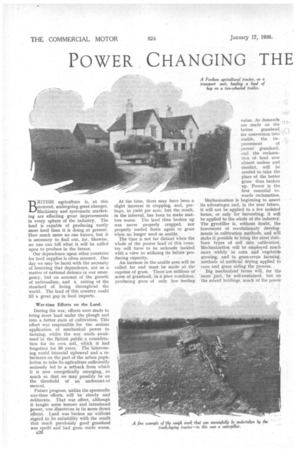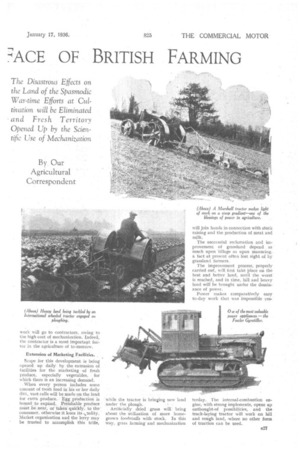POWER CHANGI G THE
Page 40

Page 41

If you've noticed an error in this article please click here to report it so we can fix it.
:ACE OF BRITISH FARMING
The Disastrous Effects on the Land of the Spasmodic War-time Efforts at Cultivation will be Eliminated
• and Fresh Territory Opened up by the Scientific Use of Mechanization B' RITISH agriculture is, at this moment, undergoing great changes. Machinery and systematic marketing are effecting great improvements in every sphere of the industry. The land is capable of producing vastly more food than it is doing at present. How much more no one knows, but it is necessary to find out, for, likewise, no one can tell what it will be called upon to produce in the future.
Our dependence upon other, countries for food supplies is often stressed. One day we may be faced with the necessity of lessening that dependence, not as a matter of national defence in war emergency, but on account of the growth of nationalism, and a raising of the standard of living throughout the world. The land of this country could fill a great gap in food imports.
War-time Efforts on the Land.
During the war, efforts were made to bring more land under the plough and into a. better state of cultivation. This effort was responsible for the serious application of mechanical power to fanning, whilst the war needs awakened in the British public a consideration for its own soil, which . it had forgotten for 50 years. The intervening world financial upheaval and a reluctance on the part of the urban 'population to take its agriculture sufficiently seriously led to a setback from which it is now energetically emerging, so much so that we may possibly be on the threshold of an undreamt-of revival.
Future progress, unlike the spasmodic war-time efforts, will be steady and deliberate. That war effort, although it taught some lessons and introduced , power, was disastrous in its more direct effects. Land was broken up without regard. to its suitability with the result that much previously good' grassland was spoilt and bad grass made worse. n'26
At the time, there may have been a slight increase in cropping, and, perhaps, in yield per acre, but the result, in the interval, has been to make matters worse. The land then broken up was never properly cropped, nor properly seeded down again to grass when no longer used as arable.
The time is not far distant when the whole of the poorer land of this country will have to be seriously tackled with a view to utilizing its fullest producing capacity.
An increase in the arable area will be called for and must be made at the expense of grass. There are millions of acres of grassland, in a poor condition, producing grass of only low feeding value. As demands are made on the better grassland for conversion into arable, the im provement of poorer grassland, and the reclamation of land now almost useless and derelict, will be needed to take the place of the better grass thus broken up. Power is the first essential towards reclamation.
Mechanization is beginning to assert its advantages and, in the near future, it will not be applied to a few isolated farms, or only for harvesting; it will be applied to the whole of the industry. The gyrotiller is, without doubt, the forerunner of revolutionary developments in cultivation methods, and will make it possible to bring the most stubborn types of soil into cultivation. Mechanization will be employed much more widely • in corn and vegetable growing, and in grass-crops farming, methods of artificial drying applied to corn and grass aiding the process.
Big mechanized farms will, for the • most part, be self-contained, but on the mixed holdings, much of the powe'r work will go to contractors, owing to the high cost of mechanization. Indeed, the contractor is a most important factor in the agriculture of to-morrow.
Extension of Marketing Facilities. , Scope for this development is being opened up daily by the extension of facilities for the marketing of fresh produce, especially vegetables, for which there is an increasing demand.
When every person includes some amount of fresh food in his or her daily diet, vast calls will be made on the land for extra produce. Egg production is bound to expand. Perishable produce mint he near, or taken quickly-. to the consumer, otherwise it loses its %,.aality. Market organization and the lorry may be trusted to accomplish this trifle, while the tractor is bringing new land under the plough.
Artificially dried grass will bring about the utilization of more homegrown foodstuffs with • stock. In this way, grass farming and mechanization will join hands in connection with stock raising and the production of meat and milk.
The successful reclamation and improvement of grassland depend as much upon -tillage as upon manuring, a fact at present often lost sight of by grassland farmers.
The improvement process, properly carried out, will first take place on the best and better land, until the worst is reached, and in time, hill and heavy land will be brought under the dominance of power.
Power makes comparatively easy to-day work that was impossible yes
terday. The internal-combustion engine, with strong implements, opens up unthought-of possibilities, and the track-laying tractor will work on hill and rough land, -whereno other form of traction can be used.




























































































